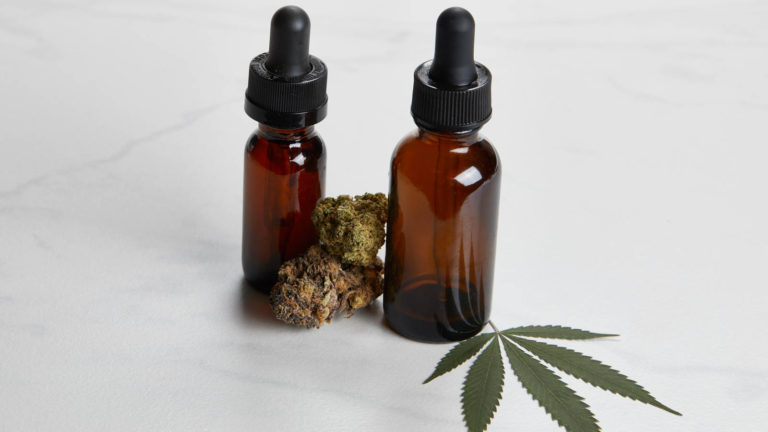With more than one-third of American adults and more than one-sixth of American children now obese, people are scrambling for a safe and effective weight loss remedy. Linked to dozens of chronic diseases, including cancer and type 2 diabetes, obesity is a serious, chronic disease in itself that may reduce life expectancy by decades.
One of the primary contributors to the climbing obesity epidemic is the consumption of excess calories. Cannabis is known for stimulating appetite, so it seems counterintuitive that the plant could have the power to win the battle of the bulge. Some recent studies have uncovered surprising possibilities about cannabidiol (CBD) oil and weight loss, however.
 Photo by: Gina Coleman/Weedmaps
Photo by: Gina Coleman/WeedmapsImage lightbox

Research overview
Most of the available research on cannabis and obesity deals with regular marijuana use or the role of another cannabinoid, tetrahydrocannabivarin (THCV), in hunger. However, there is one often overlooked study that points to CBD's potential usefulness in fighting fat.
A 2016 study published in the journal “Molecular and Cellular Biochemistry” looked at CBD's effect on cells that store fat in humans. CBD seemed to help some fat cells burn more energy and store less fat. The authors of the study concluded that CBD has the potential to prevent obesity.
 Photo by: Gina Coleman/Weedmaps
Photo by: Gina Coleman/WeedmapsImage lightbox

CBD may be helpful for those coping with anxiety disorder, panic disorder, social anxiety disorder, obsessive-compulsive disorder, and post-traumatic stress disorder (PTSD), according to a 2015 review of existing preclinical, experimental, clinical and epidemiological studies of CBD as a treatment for anxiety published in “Neurotherapeutics.” Because of this connection, the cannabinoid could help with weight control in those who eat due to stress or compulsiveness.
Unfortunately, there's a dearth of research looking specifically at CBD and obesity. Several investigate other cannabinoids and issues around weight. One study from 2013 in “Nutrition & Diabetes” found that THCV might be useful in treating obesity-related diabetes. A 2016 study published in the “Journal of Mental Health Policy and Economics” was one of a handful to find that men and women who use marijuana on a daily basis tend to have a lower body mass index (BMI) than non-users, despite the common association of marijuana with snacking or “the munchies”.
What does this research mean for real people who are trying to lose weight?
Patient perspectives
Marlon Reed started gaining weight in his 40s when his career as a retail manager skyrocketed with stress and he worried that his sporting goods store would have to shut its doors. Once active in an indoor volleyball league and as an avid jogger, Reed collapsed on the couch after work each night with an unhealthy frozen dinner. At bedtime, he felt exhausted but often had difficulty falling asleep. Fast forward almost 25 years and Reed is retired, still overweight, and living on the Atlantic coast of Florida. For the past six months, he has been exploring CBD oil and says that the results have amazed him. Reed did not disclose the type of CBD oil he was using.
In a phone interview, Reed told Weedmaps, “I started to notice a difference after the first month of using CBD oil. I felt less hungry and more relaxed. Just the stress relief alone was enough to make me eat less and sleep better. In the past six months, I've lost 31 stubborn pounds that I struggled with for decades.”
Although there are many forms of CBD, a few drops of oil a day under the tongue have helped Reed achieve results that many fad diets over the years failed to do. “I wish I had known about CBD oil sooner,” Reed mused. Although his experience is not replicated in the existing research, some medical experts have weighed in.
What the experts say
Dr. Allan Frankel, an internist who practices in Los Angeles, firmly believes that CBD oil can help a variety of ailments, including obesity. Frankel told HuffPost in a 2017 interview: “It protects your brain and your heart, helps you control your weight, and at the same time calms you down. CBD is awesome nutrition.”
 Photo by: Gina Coleman/Weedmaps
Photo by: Gina Coleman/WeedmapsImage lightbox

Frankel contends that CBD is an essential nutrient, like vitamin C or amino acid, and that people become ill when there is an imbalance of the ECS. People also become overweight, Frankel argues, but with the introduction of CBD, the body can get back on track with a decrease in appetite. Using Frankel's ideas as a guide, overweight or obese individuals could take CBD oil as a daily supplement.
Another physician, Dr. Rachna Patel, a CBD expert who practices in California, agrees with Frankel's theories. Evoking Reed's journey to weight loss, Patel shared with MSN in 2018: “I've treated patients with CBD who have had almost debilitating pain, excessive tiredness from insomnia, and anxiety that caused things like nervous eating. Once these symptoms are better managed, people are better able to take care of themselves, make healthier food choices, exercise more, and live a better quality of life.”
While CBD may facilitate a healthier overall lifestyle, to say that CBD alone is an effective method to combat weight and diabetes related issues is misleading.
Bottom line
While some patients and doctors posit that CBD oil can aid in weight loss by reducing stress and appetite, much more research is needed. Based on the available research, CBD may have a role to play but THCV may be important, as well as the whole array of cannabinoids available in marijuana or full-spectrum oil.
Major contributions from Dr. Adie Rae.

